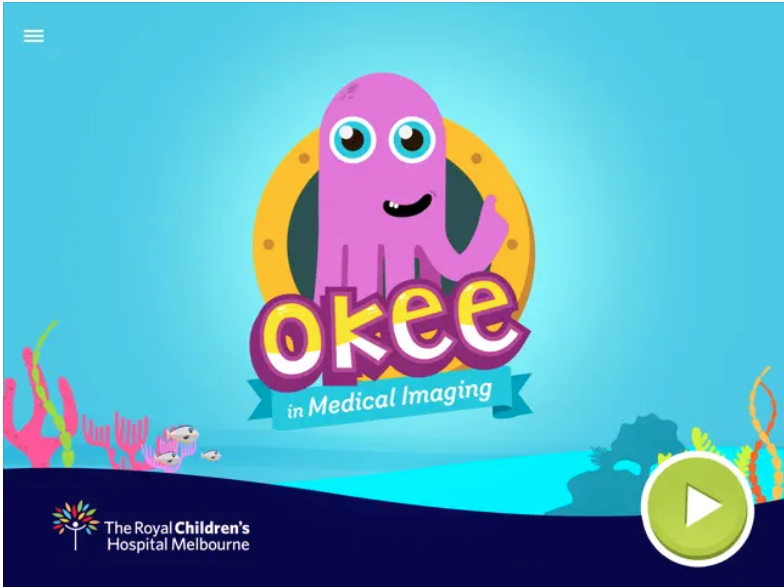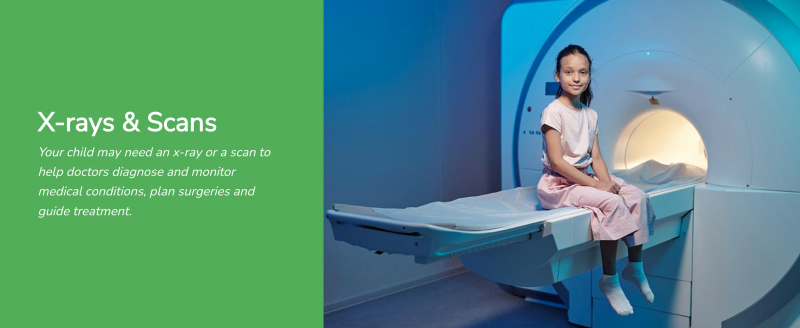CT Scans For Children
CT Scans For Children
CT scans help doctors diagnose and monitor medical conditions, plan surgeries, and guide treatments. Find out more about what a CT scan involves.
Key points about CT scans in children
- CT scan stands for computerised tomography scan
- a CT scanner uses x-ray beams to take detailed pictures of the body
- CT scans help doctors diagnose and monitor medical conditions, plan surgeries, and guide treatments
What is a CT scan?
A CT scanner is a special x-ray machine that takes detailed pictures of the inside of the body. A doctor may recommend a CT scan to help understand what's happening inside your child's body.
How long will my child's CT scan take?
A CT scan is usually very quick and may take only 5 minutes. But it can take up to about 30 minutes - it depends what type of pictures your child needs.
How does a CT scan work?
Your child will lie on a table that goes into a big, round machine. A CT scanner sends x-rays through the body from different angles and captures the x-rays on the other side to create a 3D image. Your child will not feel anything or experience any effects afterwards.
Who will my child meet during their CT scan?
The person who takes your children's pictures is called a radiographer. They can answer your questions and let your child know what they need to do.
You and your child may also meet other people, such as a nurse or play therapist. A radiologist is the doctor who will look at your children's pictures after the CT scan.
What will my child see during their CT scan?
CT scanner
A CT camera is big - it needs to be so it can take pictures of the whole body! It looks a bit like a doughnut. The photo of the CT scanner below is from The Royal Children's Hospital, Melbourne and is covered in stickers.
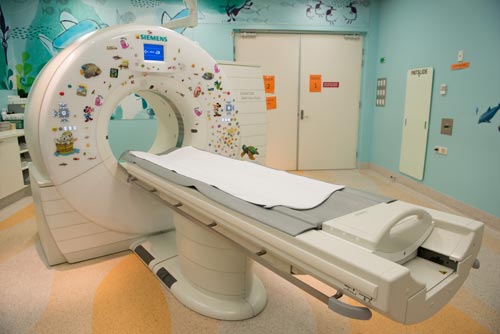
CT bed
The CT bed will move into the doughnut, but the camera won't ever touch your child.
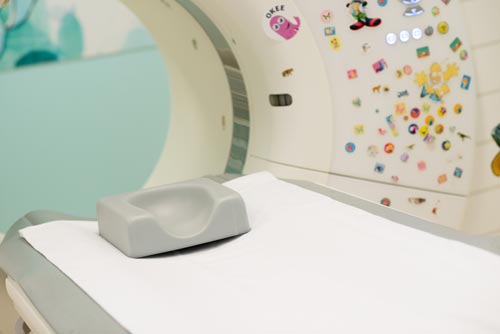
CT lead aprons
All the people in the CT room with your child will wear a special outfit. This also stops the camera from taking their picture.
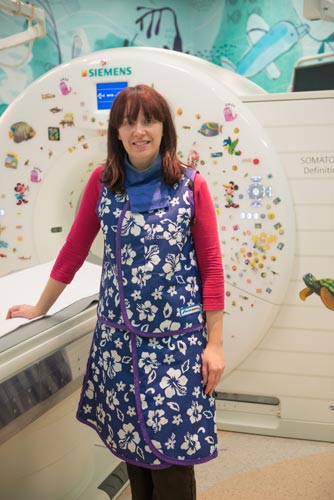
Will my child need any preparation before their CT scan?
Depending on your child's age, they may need sedation or a general anesthetic before their CT scan. Some tamariki may also need to be given contrast to help get better pictures during their scan.
Contrasts and tracers
Sometimes, CT scan pictures need something called 'contrast'. If your child needs contrast, this will usually be written in your appointment letter. Occasionally, that decision is made at the time of the scan. If your child needs contrast, they may need to arrive earlier for their appointment. This gives the staff time to prepare and give the contrast before the scan.
Contrasts and tracers are special liquids that go into the body and change how the pictures look. There are lots of different types of contrast - some you drink and there are others that need to go into a vein with a little straw called a 'cannula' or 'drip'.
See the KidsHealth page to learn more about drips
General anaesthetic (GA)
Some tamariki may find it hard to stay still long enough to have their scan. Some tamariki may need a general anaesthetic to help them go into a short sleep while they have their scan. Your appointment time will be longer if your child needs a GA.
See the KidsHealth page on anaesthetic to learn more about what a GA involves
Sedation
For younger tamariki up to 12 months old, sedation may be preferred to a general anaesthetic. The doctor will discuss this with you before the scan. If your child needs sedation, your appointment will take longer.
What will my child need to do during their CT scan?
Keeping still
It is important that your child tries to keep still while they have their scan. If they move around too much, it can make the pictures blurry. It is OK for your child to breathe normally, blink and stay relaxed.
Holding their breath
If your child is having images taken of their chest or abdomen (tummy area), they may need to hold their breath for short periods. You can practise this before their appointment.
What to wear
Have your child dressed in comfy clothes. It's important your child doesn't wear clothes with prints, sequins, glitter or metal on them - they can get in the way of the pictures. If you forget, the radiographer will give your child a hospital gown to wear while they have their scan. If your child is having pictures taken of their head, they'll need to remove jewellery like earrings and necklaces, too.
How can I help to prepare my child for their CT scan?
Asking questions
Check the date and time of your child's scan and see if there is anything you need to do beforehand to prepare. If you have any questions about the scan, contact the hospital where the scan will take place. Ask to speak to the receptionist at the CT department.
Play therapy
Some hospitals have play therapists that could be involved with your child and their scan. They can support your child with activities to help them feel more comfortable about getting a scan.
What to bring
Sometimes, you may need to wait around before your child has their scan. It's a good idea to bring some things to keep your child busy, such as books or toys. Your child may be able to take a favourite soft toy or comforter into the scan with them.
Preparing your child
It is important to talk to your child and explain why they are having a scan and what it will involve. How and when you do this will depend on their age and your judgment. The Okee in Medical Imaging App can help you to prepare your child for their scan.
Okee in Medical Imaging App
The Royal Children's Hospital Melbourne has an app you can download onto your phone or tablet. It has games that help your child to practise keeping still and holding their breath. It also has games that help explain the different types of scans.
The app is called Okee in Medical Imaging and is available from the app store.
Please be aware that some of the content in the app is specific to Royal Children's Hospital Melbourne.
See more KidsHealth content on x-rays and scans
This page last reviewed 13 September 2023.
Do you have any feedback for KidsHealth?
If you have any feedback about the KidsHealth website, or have a suggestion for new content, please get in touch with us.
Email us now